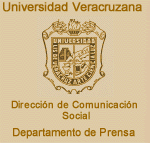
Año 5 • No. 175• Abril 18 de 2005 |
Xalapa • Veracruz • México | Publicación
Semanal |
|
Thanks to the people of Coyopolan / II Sam Sherraden |
|
I
was in Coyopolan during the last months of the brigade’s time,
and saw the incredible relationship that the students had made with
the community, as persons who provide medical services, give advice,
maintain friendship and serve as role models for the young generation
in the village. The success of the brigades is dependent on each
of these relationships, and the success of these relationships positively
impacts the lives of poor people throughout the state of Veracruz.
The brigade in Coyopolan and the few other brigades I visited left
an indelible impression on my perception of the value of community
service and the debt that the fortunate have to society. This impression of duty toward society is ingrained among the students in Coyopolan and furthermore, duty toward the community became an integral part of each of their future plans. When I asked my house mates what they would do once they left Coyopolan, each one had incorporated some elements of community service into their foreseen professional careers. Ramiro, Alma, Nancy, Brenda and Elizabeth had all been fundamentally changed in their view of education and the ways their education should be put to practice. It is rare among young professionals to be concerned with the welfare of the poor, but only because the majority has not had access to the education of Coyopolan. Not only are these students providing necessary services, but they have gained an awareness of poverty that will influence their career. Furthermore and contrary to intuition, the isolation of these experiences in the villages vastly broadens the students consciousness of problems within Mexico and problems on a global scale. Although their experiences are very specific to their village and communities, it gives the students a point of reference with which they can better evaluate other social ills that their country and others may face. Students also benefit in a number of practical ways. Brenda, the nurse in Coyopolan, once described the immense responsibility of providing health care without guidance from teachers or books. She was marveled at her ability to provide for entire communities and fascinated that her education had allowed her to have such a positive impact on others. Often in the evening, when the children had returned home, the students would be in the computer lab researching medicine and further discussing the cases of their patients. I have spent many months traveling through some of the poorest countries in the world but have only had a vague and distant of notion of how poverty functions, or more importantly how to improve the lives of the poor. I do not pretend to understand problems of poverty now, but after my two months in Mexico, I have become aware of its existence. Affluent society views poverty as a vague and rampant problem. To the upper echelon, its existence is dismissed as a harsh reality, too pervasive to remedy. The University of Veracruz has undertaken a massive effort to educate their students about the problems of rural poverty by asking them to design and carry out projects to improve the lives of members of the community. My brief time in Coyopolan exposed me to a large part of the world that I was entirely unaware of. It brought me closer to México; a country largely misunderstood by Americans, and changed my perspective on poverty and how-society views the poor. From living in the brigade in Coyopolan and meeting the brigades in the central part of Veracruz I understood that not only were students making significant contributions to society and learning a great deal from this experience, but that the brigades project elevated the entire society. With this goal in mind, I feel the brigades success with Mexican youth can be extended to youth from other countries. Adults, youth, professors, and strangers are equally impressed with my experience in Mexico because the experience was so real. Involvement of youth from other nations only furthers the ideals of the brigades and the mission of higher education. I would like to thank those people who made this experience possible, for all the people I met and host you in the United States. Thanks to the people of Coyopolan for having this ‘gringo’ to visit. Un abrazo fuerte. |
|
